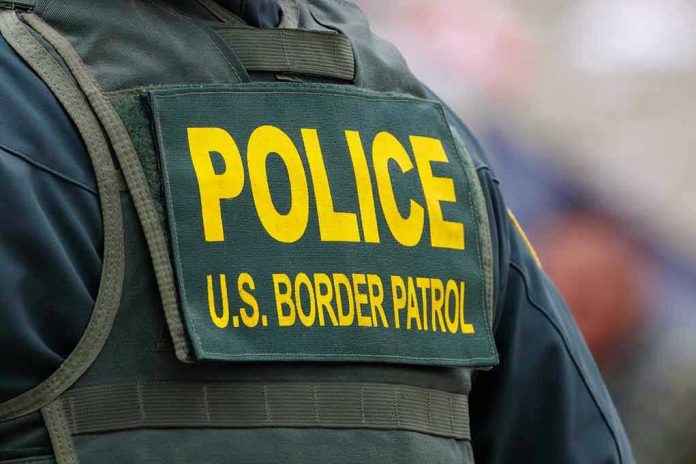
A federal immigration raid in Rochester collapsed as a massive protest left ICE agents retreating, raising urgent questions about law enforcement’s ability to uphold immigration laws in sanctuary cities.
Story Snapshot
- ICE agents retreated from a Rochester job site after a four-hour standoff with over 200 protesters, including activists and local officials.
- Protesters sabotaged federal vehicles and blocked arrests, exploiting Rochester’s reaffirmed sanctuary status.
- The confrontation highlights escalating tension between federal enforcement and local resistance as sanctuary policies embolden opposition.
- Uncertainty remains over potential charges and federal response as similar challenges may emerge nationwide.
ICE Operation Disrupted by Mass Protest and Sabotage
Immigration and Customs Enforcement (ICE) launched an enforcement action at a residential roofing job in Rochester, New York. Agents arrived early and detained one worker before two others fled to a rooftop, refusing to surrender. As activists and advocacy groups quickly spread the word, over 200 protesters—including clergy, labor leaders, and local lawmakers—gathered to oppose the operation. During the four-hour standoff, protesters slashed the tires of federal vehicles, chanted, and physically confronted agents, ultimately forcing ICE to abandon the scene without apprehending the remaining individuals.
ICE Makes Rare Catastrophically Bad Call – Ends in Retreat with Emboldened Illegals, Rioters, and Sanctuary Cities https://t.co/oVY2gijGPk
— ConservativeLibrarian (@ConserLibrarian) September 12, 2025
This outcome marks a rare and alarming instance where federal law enforcement visibly lost control amid coordinated resistance. The protestors’ willingness to vandalize government property and obstruct agents demonstrates a growing boldness in sanctuary cities, raising questions about the rule of law and the federal government’s capacity to enforce immigration statutes when local authorities refuse to cooperate. Rochester’s police, restricted by sanctuary policy, did not assist in the federal effort, further highlighting the divide between state and federal priorities.
Sanctuary Policies and Local Resistance Undermine Federal Authority
Rochester’s city council reaffirmed its sanctuary status in August 2025, just weeks before the ICE operation. This policy prohibits local law enforcement from aiding federal immigration agents, even as the Department of Justice pursues legal action against the city. This environment has made Rochester a flashpoint for federal-local conflict. The city’s construction industry, heavily dependent on immigrant labor, and the active involvement of advocacy groups set the stage for rapid, large-scale mobilization. Previous incidents, such as a controversial March 2025 traffic stop involving ICE and local police, have already inflamed tensions and led to internal investigations.
Federal agencies retain the legal authority to enforce immigration law but face increasing challenges in cities where local governments and community activists are committed to resistance. Advocacy organizations, labor unions, and even religious institutions have taken up the mantle of protecting undocumented immigrants, often framing federal enforcement as an attack on family and community values. The power dynamic has shifted, enabling physical obstruction of federal operations and emboldening those who would otherwise fear arrest or deportation.
Escalating Legal and Political Consequences for Sanctuary Cities
The immediate aftermath of the Rochester raid is a vivid illustration of the potential for further confrontations nationwide. With no arrests made beyond the first detained worker and with federal vehicles vandalized, the federal government’s options appear limited. ICE and Customs and Border Protection have issued minimal statements, while local advocacy groups celebrate what they see as a victory for civil resistance. Meanwhile, legal negotiations continue for the individuals who evaded arrest, and the city remains embroiled in a federal lawsuit over its sanctuary policy.
These developments signal both short- and long-term risks: a further emboldening of activist networks, increased anxiety in immigrant communities, and mounting legal and political pressure on city officials. For conservatives concerned with constitutional order, public safety, and the integrity of immigration law, this incident serves as a stark warning. If federal authority can be openly defied and law enforcement physically obstructed, the precedent set in Rochester may soon be replicated in sanctuary cities across the nation.
Sources:
ICE Raid in Rochester Disrupted by Crowd of Opposition
Immigration Attorney Speaks on ICE Operations in Rochester Area
A traffic stop put Rochester in the spotlight over sanctuary cities—and tore apart a woman’s family
ICE agents in the Park Ave neighborhood spark large-scale protest



